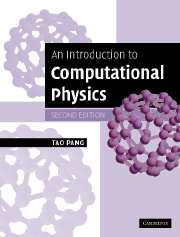Book contents
- Frontmatter
- Contents
- Preface to first edition
- Preface
- Acknowledgments
- 1 Introduction
- 2 Approximation of a function
- 3 Numerical calculus
- 4 Ordinary differential equations
- 5 Numerical methods for matrices
- 6 Spectral analysis
- 7 Partial differential equations
- 8 Molecular dynamics simulations
- 9 Modeling continuous systems
- 10 Monte Carlo simulations
- 11 Genetic algorithm and programming
- 12 Numerical renormalization
- References
- Index
4 - Ordinary differential equations
Published online by Cambridge University Press: 05 June 2012
- Frontmatter
- Contents
- Preface to first edition
- Preface
- Acknowledgments
- 1 Introduction
- 2 Approximation of a function
- 3 Numerical calculus
- 4 Ordinary differential equations
- 5 Numerical methods for matrices
- 6 Spectral analysis
- 7 Partial differential equations
- 8 Molecular dynamics simulations
- 9 Modeling continuous systems
- 10 Monte Carlo simulations
- 11 Genetic algorithm and programming
- 12 Numerical renormalization
- References
- Index
Summary
Most problems in physics and engineering appear in the form of differential equations. For example, the motion of a classical particle is described by Newton's equation, which is a second-order ordinary differential equation involving at least a second-order derivative in time, and the motion of a quantum particle is described by the Schrödinger equation, which is a partial differential equation involving a first-order partial derivative in time and second-order partial derivatives in coordinates. The dynamics and statics of bulk materials such as fluids and solids are all described by differential equations.
In this chapter, we introduce some basic numerical methods for solving ordinary differential equations. We will discuss the corresponding schemes for partial differential equations in Chapter 7 and some more advanced techniques for the many-particle Newton equation and the many-body Schrödinger equation in Chapters 8 and 10. Hydrodynamics and magnetohydrodynamics are treated in Chapter 9.
In general, we can classify ordinary differential equations into three major categories:
(1) initial-value problems, which involve time-dependent equations with given initial conditions;
(2) boundary-value problems, which involve differential equations with specified boundary conditions;
(3) eigenvalue problems, which involve solutions for selected parameters (eigenvalues) in the equations.
In reality, a problem may involve more than just one of the categories listed above. A common situation is that we have to separate several variables by introducing multipliers so that the initial-value problem is isolated from the boundary-value or eigenvalue problem.
- Type
- Chapter
- Information
- An Introduction to Computational Physics , pp. 80 - 118Publisher: Cambridge University PressPrint publication year: 2006



